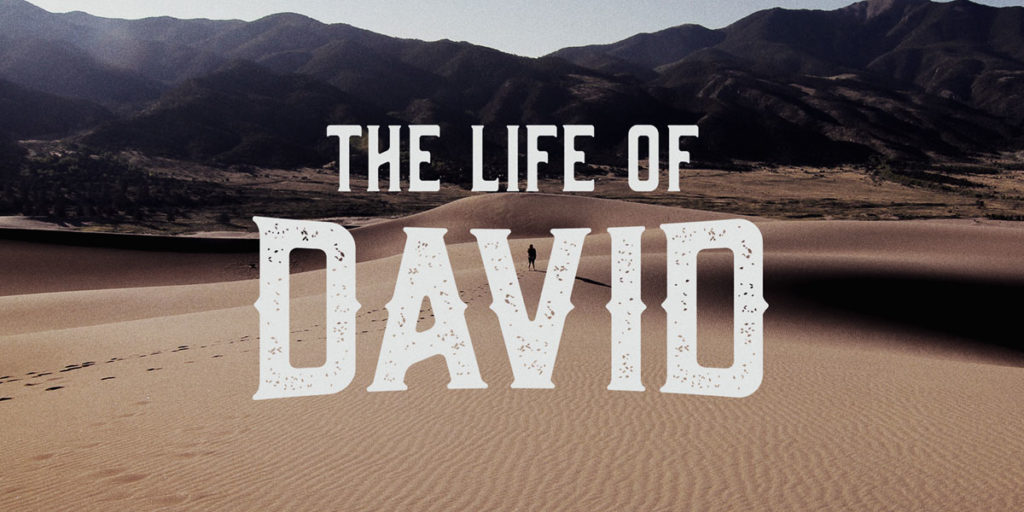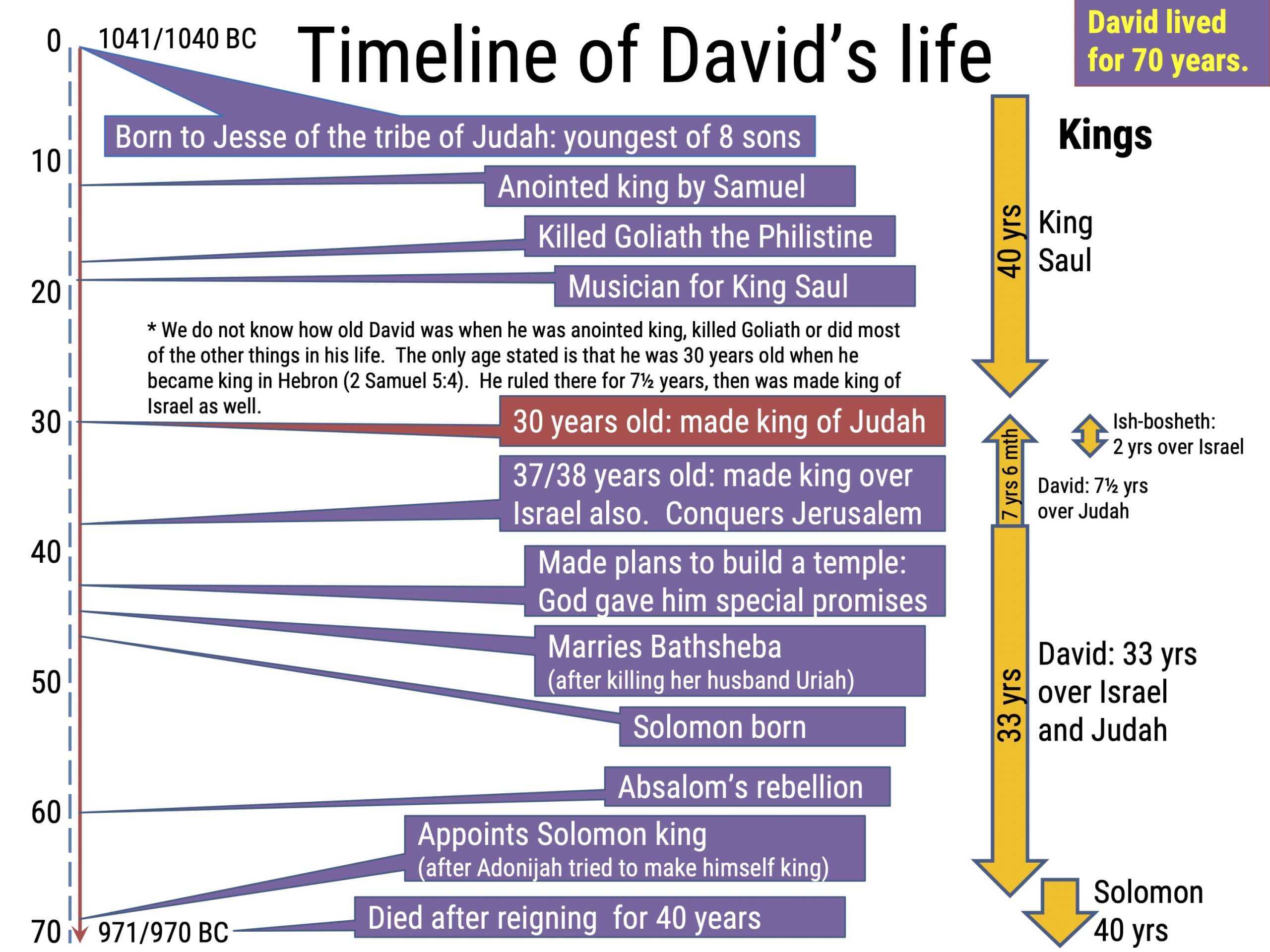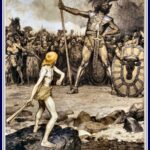David was born in Bethlehem, the second son of Jesse. At the time, the king of Israel was Saul. Saul’s son Jonathan had become a great friend of David and honored him over his own brothers.
Saul became jealous of David, so he tried to kill him many times. Finally, he gave up on trying to get rid of David and made him his armor-bearer instead.
One day Jonathan and Saul went hunting together. While they were away, David killed Goliath and brought his head home as proof that he had done so (1 Samuel 17:50). Saul came to understand that God was with David as a result of this incident because it appeared impossible to kill this giant with just a sling shot (verse 51).
After that, Saul became afraid for his life when he realized that God had chosen David as king instead of him so he fled from his presence (verses 52-53).
Then Jonathan wanted to go see his father so that he could tell him about how much pride he has for David so he told him everything about what happened between them which made Saul very angry (verses 54-56). In this article you’ll learn the king david characteristics, and facts about david in the bible.

What Are the Key Characteristics of David?
In the biblical narrative of the Books of Samuel, David is described as a young shepherd and harpist who gains fame and becomes a hero by killing Goliath. He becomes a favorite of Saul, the first king of Israel, but is forced to go into hiding when Saul suspects that David is trying to take his throne.
David possessed several key characteristics that defined his life and made him a central figure in biblical history. These characteristics include:
- Faith in God: David’s unwavering trust in the Lord and his reliance on God’s guidance were evident throughout his life.
- Bravery: David’s defeat of Goliath showcased his fearlessness and courage in the face of overwhelming odds.
- Humility: Despite being anointed as king, David remained humble and recognized his dependence on God.
- Repentance: David’s willingness to acknowledge his sins and seek forgiveness from God demonstrated his repentant heart.
- Wisdom: David was known for his wisdom and discernment, which allowed him to make sound decisions as a leader.
- Musical Talent: David was a skilled musician and songwriter, writing many of the Psalms found in the Bible.
- Compassion: David showed empathy and kindness towards others, even to those who were his enemies.
Life Of David In The Bible Summary
David was a shepherd, anointed as king of Israel, and the second and greatest king of Israel. He united Israel into a single kingdom during his reign. He inherited the throne from his grandfather and maintained it with the support of God alone. King David’s story is one that gives us great hope in the midst of difficult challenges. In spite of all his hardships, he always returned to God for direction and strength. The Life of David is a heartwarming story about a young shepherd boy who became the king who brought unity to Israel by conquering all surrounding enemies. He also set up Jerusalem as his capital city, where he built an altar on Mount Zion to worship God more fully than in any other place on earth
David’s story begins with his humble beginnings as a shepherd boy, but he quickly rose to prominence when he defeated the giant Goliath with just a sling and a stone. He went on to become a trusted adviser to King Saul, but after Saul’s death, David was anointed as the new king of Israel.
David was a shepherd, anointed as king of Israel, and the second and greatest king of Israel.
The life of David is one of the most interesting stories in the Bible. He was a shepherd, anointed as king of Israel, and the second and greatest king of Israel.
David was a shepherd and musician who became known for killing Goliath with his sling. After this victory, David went on to become King Saul’s armor bearer (1 Samuel 16:20). King Saul was jealous of David because his popularity grew so quickly with both men and women due to his handsome appearance as well as his skillful playing on instruments like the harp or lyre (1 Samuel 16:18–19). Once again, we see jealousy in someone who doesn’t want to be replaced by another person who is more talented than themselves!
David as a shepherd, who would later become the king of Israel, was a humble and mild-mannered man who walked humbly with God.
David was a humble and mild-mannered man who walked humbly with God. As a shepherd, he would later become the king of Israel.
He united Israel into a single kingdom during his reign. He inherited the throne from his grandfather and maintained it through the support of God only.
David was a humble and mild-mannered man. He worked as a shepherd before he became king, and he even fought against the giant Goliath when no one else would. David was famous for his battle with Goliath and other moments in which he showed great strength and bravery.
The story of King David is recorded in 1 Samuel 16–1 Kings 2.
King David’s story is one that gives us great hope in the midst of difficult challenges.
The story of David is one that gives us great hope in the midst of difficult challenges. His life is a reminder that no matter where we are, God can use our experiences to accomplish his purpose for our lives. If we look at David’s life from a modern-day perspective, it’s easy to see God’s hand at work.
- The story begins with David being called out by God as king over Israel despite having no royal lineage or political powerbase on which to build his kingdom (1 Sam 16:1).
- He demonstrates incredible faith when he obeys God’s command to make Goliath his enemy rather than running away (1 Sam 17:32). This faith allows him to defeat Goliath and save Israel from this giant threat; however, some people were so afraid they ran away! They were not faithful enough to trust God’s promise that victory would come through David.
In spite of all his hardships, he always returned to God for direction and strength.
David, being a man of humble heart and mild temperament, always returned to God for direction and strength.
David was the second king of Israel after King Saul, who had been deemed unworthy by God because he failed to kill the enemy Amalekites. David was anointed king at Bethlehem by Samuel (a prophet), who also anointed his son Solomon as successor.
As we all know from our Bible stories, David became a great warrior who united Israel into a single kingdom under his leadership. He was also a gifted musician and songwriter; some of his most well-known compositions include Psalms 25:1-12; 29:10; 30:9; 34:2-22; 51:1-17; 57:7-14; 68:5-9
The life of David is a heartwarming story about a young shepherd boy who became the king who brought unity to Israel by conquering all surrounding enemies.
The life of David is a heartwarming story about a young shepherd boy who became the king who brought unity to Israel by conquering all surrounding enemies.
David was a shepherd, anointed as king of Israel and the second and greatest king of Israel. He united Israel into a single kingdom during his reign. He inherited the throne from his grandfather, Saul, and maintained it through the support of God only.
As you read this story you will see how God watches over His people even when they make mistakes or sin against Him.
He also set up Jerusalem as his capital city where he built an altar on Mount Zion to worship God more fully than in any other place on earth.
The Bible also tells us that David built an altar on Mount Zion to worship God more fully than in any other place on earth.
Despite all his hard times, he never stopped following God’s direction and strength.
In the book of 1 Samuel, King Saul was at war with the Philistines. The Philistines sent a giant called Goliath to fight against Israel. Goliath challenged anyone from Israel to come out and fight him, but no one would answer his challenge because they were terrified of him.
David told Saul that he would fight Goliath for him if Saul gave him permission. David went out into the battlefield against this giant of a man armed only with his slingshot and five stones in it (1 Sam 17:41). David killed Goliath because God gave David strength over this giant, who was much taller than he was (1 Sam 17:51-54).
This story shows us how important following God’s direction is when we are facing trouble or conflict in life; if we trust Him He will give us strength over our troubles or conflict just as He did for David against Goliath!
King David Characteristics
Ability to 1) Admit Error
Do you ever wonder why the Bible has so much history in it? One important goal is to shed light on God’s interpersonal dynamics.
Both good and bad deeds were committed by people in the Bible. By looking at their past, we can gain insight into what worked and what didn’t. That old adage about how history tends to repeat itself is spot on.
David was no exception to the rule; he, too, made blunders and fell short on occasion. The errors here are not the kind that crop up frequently in normal conversation. Larger decisions could be more apt.
David is standing on top of the building, surveying the city below, when he spots a beautiful woman taking a shower below him. The length of time he stared at her is unknown, but he certainly didn’t back away to give her some space. He sinned and, worse, killed because of the way he “looked.”
As a result of his sin with Bathsheba and his murder of Uriah, David disobeyed nearly half of the Ten Commandments. What he did was wrong, horribly wrong, and we can all agree on that. However, that was not the final chapter. David realized he was incorrect.
To read David’s confession, turn to Psalm 51:3 (NIV). For my sins are not hidden from me; rather, they stare me in the face daily.
In this case, the man in charge admitted he was wrong, which was a huge deal. To be sure, David made some blunders, but as a leader, he was also willing to make some improvements.
Recognizing his own frailty and admitting it took humility
Once, General William Booth was asked what he did to achieve such great success. With sudden emotion, he announced, “The secret is this: God has all there was of me.” There have been men smarter and luckier than me, but ever since I saw what Jesus could do through the poor of London, I’ve been determined that God should have all of William Booth.
Dr. J. Wilbur Chapman, who posed the question, reflected on the topic and said, “I learned from William Booth that his surrender measures the gravity of a man’s power.”
General Booth and David share a lot of common ground. When David was tasked with wiping out the Amalekites, he admitted his inability to carry out the mission on his own and instead gave control to God.
In spite of his challenges, David was able to draw strength from the Lord his God (1 Samuel 30:6).
David found his weakness fascinating because it gave him a greater appreciation for God’s strength.
Three) The guts to take charge when things get tough
The truth is that Saul did indeed gather a force to confront the Philistines. However, their fear increased exponentially when they laid eyes on Goliath.
From what we can gather from 1 Samuel 17:4–7 (NIV), Goliath was a massive giant. Six cubits and a span was the measure of his stature. He wore a bronze helmet and a bronze scale coat of armor that together weighed five thousand shekels; bronze greaves protected his legs, and a bronze javelin hung from his back. The iron tip of his spear was worth six hundred shekels, and the shaft was the size of a weaver’s rod. A person bearing his shield preceded him.
The army’s reaction to Goliath is summarized in 1 Samuel 17:11 (NIV). Following the Philistine’s speech, “Saul and all the Israelites were dismayed and terrified.”
While Jesse sent David to the battlefield to check on his brothers, God had other plans for the courageous youth. God has great plans for this humble messenger boy.
Goliath had challenged the Israelite soldiers to a battle, and David overheard it. He was unafraid of the large giant, so he stepped up and offered to fight for them.
That’s why David tops all other giant-killers. Heroes are able to rise to the occasion when things get difficult. David stepped up when no one else would.
fourthly, a deep devotion to God
Allow your passion to become your purpose, and it will one day become your profession, said Gabrille Bernstein.
It was God who became David’s driving force. Even when David was young, this trait was obvious. Caretaking the sheep was his job, and he took it seriously.
David is being trained by God for the great battle ahead by completing this task. Every day that David guarded his flock, God was on his side. David did not abandon his faith in God.
He was capable of hand-killing both lions and bears. David’s faith was bolstered every time an animal went into battle with him. Having previously killed lions and bears, he felt prepared to take on Goliath.
David’s devotion to God bore fruit when the Almighty chose him for a special mission that would become his life’s work.
5) The ability to adapt
As David well understood, the only thing that ever stays the same is change. Instead of accepting mediocrity, he vowed to fight for the best.
David was human after all; he had flaws and was susceptible to weakness. His missteps were extremely costly. David, however, was confident that God had yet to reveal his full potential.
In Psalms 51:10 (New International Version), we find one of the most humbly written prayers in the Bible. “Let God form a new and righteous heart within me,” it prays.
David realized he needed a spiritual transformation to fulfill God’s plan for his life. Consequently, this was the catalyst that transformed David into a man after God’s own heart.
Facts About David In The Bible
Some of what we know about David is listed below.
First, David’s ancestry was Judahite.
Israel’s 12 tribes trace their ancestry back to Jacob’s 12 sons, and with the exception of Levi, each tribe had administrative jurisdiction over a distinct region of the country. Even though Israel’s first king, Saul, was from the tribe of Benjamin, the tribe of Judah eventually became the tribe of kings because of the success of its most famous son, Judah, who “prevailed over his brothers” (1 Chronicles 5:2).
Jerusalem was part of the land that Judah controlled. David, as king, made Jerusalem the center of Jewish government and worship, forever changing the status of Judah in Jewish culture. About 400 years passed under David’s descendants as kings of Jerusalem before Nebuchadnezzar conquered the city and ended the dynasty.
Ruth and Boaz’s great-grandson David
The story of love and redemption found in the Book of Ruth. God’s love for Israel is depicted through the lives of three people: Naomi (Ruth’s mother-in-law), Boaz (Boaz’s brother), and Boaz’s wife (Boaz).
Ruth and Boaz are the ancestors of David. Several biblical passages detail his family tree, all of which agree that he was descended from Jesse, who descended from Obed, who descended from Boaz and Ruth, making him the great-grandson of that influential couple (1 Chronicles 2:12).
It was in the blood to redeem themselves. David was the instrument through whom God showed his mercy and redeemed his people many times throughout his life. His death elevated him to a symbol of God’s special plan for Israel and future redemption.
When God finished creating everything, he rested on the seventh day and declared it holy, and David was the youngest of his seven sons (or his seven brothers) (Genesis 2:3). Thus, the number seven became universally significant in all aspects of ancient Jewish culture as a symbol of perfection and finality. To this end, on the seventh day of the seventh month, Jews celebrated the Feast of Tabernacles for seven days. After seven sets of seven years, the Jubilee year occurred, during which debts were cancelled and property was restored to their rightful owners.
David was either Jesse’s seventh son or eighth son, depending on which biblical author you read (1 Chronicles 2:13–14, 1 Samuel 16:10–11). The point is not whether this represents a contradiction or whether one of David’s brothers was simply omitted from the text. Since David was not the firstborn son, a privileged position in Judaism, the authors were determined to incorporate the number seven, linking David with holiness and God’s perfect plan for his people.
For number four, David was a native of Bethlehem.
Most Christians believe that Jesus was born in the small town of Bethlehem. Nonetheless, another savior emerged from this modest community centuries before Jesus. Because of its association with David and the fact that it was there that Samuel anointed him king of God’s people, Bethlehem is called “the town of David” (Luke 2:4) in Luke’s Gospel.
In spite of the fact that modern readers are more likely to focus on the fact that Jesus was born in a manger, it is crucial to remember that this manger was in Bethlehem, the city that the Jewish people associated with one of the most momentous announcements in their history, the city where their most important king had his humble beginnings.
5 God anointed David as his chosen king.
Most people are aware that Jesus is often called the Messiah. However, he wasn’t the only person to ever wear that badge. “anointed one” and “messiah” are interchangeable terms in the Bible. The one whom God anointed to be the savior and leader of his people. Saul was anointed by the prophet Samuel to show that God had chosen him for this role when the Israelites demanded a human king.
Samuel poured olive oil over Saul’s head, kissed him, and proclaimed, “Has not the Lord anointed you ruler over his inheritance?” First Samuel 10:1
God’s rejection of Saul as king came years later, after Saul had disobeyed him (1 Samuel 15:26). It had come time for God to make a new selection. For this reason, he dispatched Samuel to Jesse of Bethlehem, telling him, “I have chosen one of his sons to be king” (1 Samuel 16:1).
The oldest, Eliab, was the one Samuel assumed was God’s pick based on appearances alone.
In the words of Samuel, “When they arrived, he saw Eliab and thought, “Surely the Lord’s anointed stands here before the Lord.” 1 Samuel 16:6
God, however, made it clear to Samuel that he does not select kings in the same ways that humans do.
“Ignore his height and other physical attributes; I do not want you to date him. The Lord isn’t interested in the same things that humans are. Everyone else judges by appearances, but God looks at the heart. —Song of Solomon 2:4
In an earlier prophecy, Samuel told Saul, “Because you have not kept the Lord’s command, he has sought out a man after his own heart and appointed him ruler of his people” (1 Samuel 13:14). And the Lord said to Samuel, “Rise and anoint him; this is the one” when Samuel saw David, the youngest son of Jesse, the shepherd.
While Samuel’s anointing of David did not immediately make him king, it did mark him as the Lord’s chosen one, and “from that day on the Spirit of the Lord came powerfully upon David” (1 Samuel 16:13).
A shepherd by trade, David
Shepherding was David’s first profession before he became king. That’s why he wasn’t there when Samuel came to anoint the new king and his brothers were (1 Samuel 16:11). David was torn between his responsibilities as Saul’s musician and those of tending his father’s sheep when the Philistines (and Goliath) invaded (1 Samuel 17:15).
David did more than tend and herd his father’s flock during his time as a shepherd. While a shepherd’s job may not seem important, it was actually quite risky. To protect his father’s flock, David slaughtered both bears and lions. David even uses his background as a shepherd to make his case to Saul that he can take down Goliath:
“I have been keeping my father’s sheep as your servant. If a lion or bear attacked and took a sheep from the herd, I would chase it down, strike it, and pull the sheep from its jaws. When it turned its attention to me, I grabbed it by the hair, slew it with a single blow. This uncircumcised Philistine will meet the same fate as the lion and the bear your servant has slain, for he has defied the armies of the living God. I know that the Lord, who delivered me from the lion’s and bear’s claws, will deliver me from the hand of this Philistine. Verse 34-37 of 1 Samuel
David, in his fight with Goliath, would once again protect “his father’s sheep” (the people of Israel, whom Yahweh had made his flock). This time, however, the Lord would come to his aid against an enemy so formidable that Saul and his entire army were in mortal fear of him (1 Samuel 17:11).
In later years, drawing from his time spent tending sheep, David penned a powerful depiction of God’s relationship with his people that anticipated Jesus’ role as “the good shepherd” (John 10:11):
I have everything I need because the Lord is my shepherd.
For he lays me down in verdant pastures,
He takes me to the banks of placid lakes,
When I’m around him, I feel renewed.
He shows me the way that I should go.
in honor of his name alone.
Despite the fact that I am on foot
crossing the valley of shadows,
Never again will I be afraid,
since you stick by my side;
your walking stick and staff,
The words give me peace of mind.
In front of me, you set a table.
while surrounded by my adversaries.
You pour oil on my head;
There’s no more room in my cup.
Absolutely, I will be accompanied by your kindness and affection.
always and forever,
and my home is in the temple of the Lord.
forever.” —Psalm 23:1-6
7 David played the violin
Saul was anointed by Samuel, and the Spirit of the Lord descended upon him, long before David was (1 Samuel 10:1–6). The Lord’s Spirit left Saul when David was anointed, and a demon began tormenting him (1 Samuel 16:14).
When Saul’s servants heard the specter was going to visit, they thought a musician would calm him down. And it so happened that David was also quite the talented musician. Because of this, Saul recruited him and made him an armor bearer.
David would pick up his lyre and start playing whenever the Holy Spirit visited Saul. Then Saul would feel better, and the evil spirit would leave him. The Bible, 1 Samuel 16:23
After this, David’s responsibilities included both tending to his father’s flock of sheep and performing musical acts for the king.
David killed many giants.
David’s famous battle with the Philistine giant Goliath is one of his most well-known achievements. Both the Israelite and Philistine armies stood on their respective hills, and Goliath challenged the Israelites to a duel by pitting himself against one of the Israelites (1 Samuel 17:8-11).
No one was interested in accepting his offer. But David had come to the Israelite camp to play music for Saul, and he overheard Goliath mocking the Israelites. And he overheard the Israelites discussing the rewards Saul had promised to the one who killed Goliath (1 Samuel 17:23-27).
The Israelites weren’t the only ones Goliath was mocking. It was as if he were challenging God on his own ground. With each passing day, Israel’s leaders implicitly admitted that their God was no match for Goliath’s gods. David would no longer stand for this situation to persist. David picked up five stones and went out to face Goliath after persuading Saul to let him do so.
In mockery and oaths, Goliath cursed and belittled David. But David famously shot back:
While you’ve chosen to fight me with sword, spear, and javelin, I’ve chosen to fight in the name of the Lord Almighty, God of Israel’s armed forces, whom you have insulted. The Lord has given me the day to strike you down and sever your head. Today, the world will learn that Israel has a God because I will feed their corpses to the birds and beasts. For the Lord has the victory in this battle, and he will deliver you all into our hands, so that all who are gathered here may know that salvation comes from the Lord apart from sword or spear.
David slew the giant Goliath with a single stone from his sling. He cut off Goliath’s head and stole his sword and spear as souvenirs.
David, Goliath, and their encounter have become cliched symbols for underdogs, brutal antagonists, and stories of overcoming impossible odds because of how often the story of David and Goliath has been told in literature and art.
However, this isn’t a tale of the underdog in the Bible. This is a tale of trust. After defeating Goliath, David faced and defeated countless foes because of his unwavering faith.
In addition to being a skilled soldier, David also
By vanquishing Goliath, David launched his career as a warrior. God was with David no matter where Saul sent him, and he always achieved greatness. Moreover, Saul gave David more authority as his career progressed:
David was so effective in every mission Saul assigned him that Saul promoted him to the rank of general. All the soldiers and Saul’s officers were happy about this. —Song of Songs 18:5
But gradually David began to be held in higher esteem than Saul. Women of Israel celebrated their victory over the Philistines by dancing and singing:
There are thousands of dead because of Saul.
to David’s tens of thousands. —Simon Peter, 1 Samuel 18:7
That’s why Saul felt threatened by David; it’s only natural. Saul began to be afraid of David as his reputation as a fierce fighter spread. Saul’s greatest asset was driven away because of his anxiety. Multiple times he tried to kill David and thereafter became his sworn enemy.
After Saul was killed fighting the Philistines, David went to war with Abner, Saul’s general, and Ish-Bosheth, Saul’s youngest son and the one Abner anointed king of Israel.
Over time, David rose to power and became king, but he didn’t stop being a legendary warrior.
Ten. The greatest king of Israel was David.
David’s path to the throne was long and winding, despite the fact that he had been anointed to lead God’s people. It was clear that Saul’s followers would not simply hand over power to David after he was killed in battle. Don’t forget that Saul also received anointing. And David was allied with and fighting on behalf of the Israelites’ mortal enemies, the Philistines.
After Saul’s death, the tribe of Judah appointed David king (2 Samuel 2:4), but Abner son of Ner, Saul’s military commander, anointed Saul’s son Ish-bosheth king over the rest of Israel. Ish-bosheth became the second king of Israel, while David ruled over Judah.
Ish-reign bosheth’s was cut short, unfortunately. Even though Ish-bosheth and Abner fought against David the entire time he was king, David did not end their lives.
Ish-bosheth and Abner were both slain. David was devastated by the news that Abner had been murdered for vengeance and he vowed to seek revenge. Israelites who were trying to gain David’s favor killed Ish-bosheth. David was not pleased to hear this “good news,” so he had them both put to death.
Upon the death of Saul, the elders of Israel convened with David, then thirty years old, and anointed him king over all of Israel (2 Samuel 5:3-4).
As Saul ruled, Judah was in possession of the Ark of the Covenant and Jerusalem fell under his control. David, once crowned king, retook the citadel of Zion (later renamed the City of David), conquered Jerusalem, and brought the Ark back to the holy city.
During his reign as king of Israel, David was successful in battle and led his people closer to God while expanding Israel’s territory and military might.
11 David had an affair with the beautiful Bathsheba.
David was taking a stroll along the roof of his palace when he spotted a beautiful woman taking a dip while his armies were out fighting without him. To learn more about her, he dispatched an enquirer and discovered that she was married to Uriah the Hittite, one of his finest soldiers (2 Samuel 23:39).
There was no way David could continue with this relationship, even though it was hundreds of years before Jesus said that looking at a woman lustfully was committing adultery in your heart (Matthew 5:27-28). It was forbidden by the Torah and carried the death penalty (Leviticus 18:20; Deuteronomy 5:18; Exodus 20:14). (Deuteronomy 22:22, Leviticus 20:10).
David was aware of all of this, but he still sent for her, slept with her, and subsequently conceived her child (2 Samuel 11:4-5). David devised a plan to cover up his sin when he found out she was pregnant. Uriah, her husband, was away at war, so David had him brought back. No one could accuse Uriah of being the father of the child if he had slept with her.
Unfortunately, things didn’t pan out that way. Uriah finally told David after David had repeatedly urged him to spend time with his wife:
“The ark is in tents with Israel and Judah, and my commander Joab and my lord’s men are camped out in the open. So I couldn’t even go home to eat, drink, and make love to my wife in peace. I swear on my life that I will not do that. —The Book of Second Samuel, Chapter Eleven
David committed another sin as a means of covering up the first.
12, David planned Uriah’s murder
In battle, David was ruthless and killed many foes. After battles, he would often execute many prisoners. There were a lot of criminals he put to death. Yet one murder “displeased the Lord” in particular (2 Samuel 11:27). David planned to have Uriah killed in battle when he realized he couldn’t force Uriah to sleep with his wife Bathsheba and thus hide David’s adultery.
“David penned a letter to Joab that morning and had Uriah deliver it. Put Uriah up front where the action is,” he instructed. Then you should back away from him so he can be fatally struck.
Joab had Uriah stationed where he anticipated the most stalwart resistance to be while he laid siege to the city. Some of David’s army fell, and Uriah the Hittite also perished, when the city’s inhabitants rose up in rebellion against Joab. 2 Samuel 11:14-17
Joab worried that David would be upset that he had to sacrifice other men in order to have Uriah killed in battle (2 Samuel 11:20). David, on the other hand, was unconcerned. Specifically, he told Joab’s envoy,
Tell Joab, “Don’t let this upset you; the sword devours one as easily as another. Get in close and obliterate the city. Joab, this is what you should say to boost his morale. —Simon 11:25 of 2 Samuel
David’s attempts to conceal his guilt came at the cost of the lives of God’s people.
After Uriah’s death and Bathsheba’s period of mourning, David wed her, and the two of them had a son.
A later time, the prophet Nathan admonished David for his behavior. Nathan related a tale about a wealthy man who stole a valuable lamb from a poor man. David, not realizing that the story was a metaphor for what he had done to Uriah with Bathsheba, condemned the man in the story (2 Samuel 12:1-10). The son born of David’s adultery died, despite Nathan’s assurance that “the Lord has taken away your sin” (2 Samuel 12:13).
David sinned horribly. Psalm 51 was written after David’s meeting with Nathan, and it shows how contrite and sorry he was for his sins.
A man after God’s own heart: that was David in verse 13.
Saul was reprimanded by the prophet Samuel, who told him, “the Lord has sought out a man after his own heart,” before anointing David (1 Samuel 13:14). Only David receives this honor in the Bible. Nowhere in the Bible, however, does Samuel explain what he meant by this. Perhaps he meant only that David was concerned with the same things that God was. There may be some insight into God’s nature that can be gleaned from studying David.
Paul seems to provide some context for this in Acts 13:22:
With Saul gone, he anointed David king. His testimony from God was, “I have found David son of Jesse, a man after my own heart; he will do everything I want him to do.”
The reason Samuel called David “a man after God’s own heart” seems to be due to David’s devotion to God. On the other hand, it’s important to remember that God forbade David to construct the Temple of Solomon after he murdered Saul (1 Chronicles 28:3). David’s desires and God’s seem to be at odds with one another.
Interesting fact: the verse Paul uses is not the same as the one you’ll find in 1 Samuel 13:14. It’s because most modern Bibles use the original Hebrew from the Masoretic Text for Old Testament passages, while Paul is quoting an early Greek manuscript of the Old Testament known as the Septuagint.
14 David was born sometime around the year 1000 B.C.
Although his date of existence is not given in the Bible, most scholars agree that it was sometime around the year 1000 B.C. Inscriptions on a stone stele called the Tel Dan Stele mention the “House of David” and are dated to the late ninth or early eighth century BC. The Moab Stele, a monument erected in the same time period, may also make reference to David. There is evidence that sections of 1 and 2 Samuel were written as early as the seventh and sixth centuries BC, drawing on even earlier accounts.
A minimum of eight women were married to David.
King David amassed a large number of spouses and concubines. The Bible only mentions eight of his wives, but he may have had more. What follows is a list of those things:
Haggith Abital Eglah Michal (daughter of Saul) Bathsheba Ahinoam of Jezreel Abigail (widow of Nabal of Carmel)
There is no comprehensive list of David’s wives in the Bible, but we learn the names of six of his wives and six of his sons in 2 Samuel 3:2–5; in addition, we learn that David marries Michal in 1 Samuel 18:27 and Bathsheba in 2 Samuel 11:27.
About half of the Psalms were composed by David.
Quite the musician, David. He also used his God-given talent for songwriting. David’s laments and songs are peppered throughout the Old Testament, marking significant events and expressing profound emotion, such as when he learns of Saul and Jonathan’s deaths (2 Samuel 1:19-27).
The ancient Jewish Masoretic Text attributes authorship of 73 of the 150 Psalms to David. The number of Psalms traditionally attributed to David is closer to 85 because it includes Psalms not included in the Septuagint (an early great translation of the Old Testament) or the Latin Vulgate (a Latin translation of the Bible from the fourth century).
David didn’t contribute as much to the Bible as Moses, Ezra, Luke, Jeremiah, or Paul, despite the common misconception that Psalms is the largest book of the Bible. The entire book of Psalms is only 30,000 words long, and each of these authors wrote at least 32,000!










